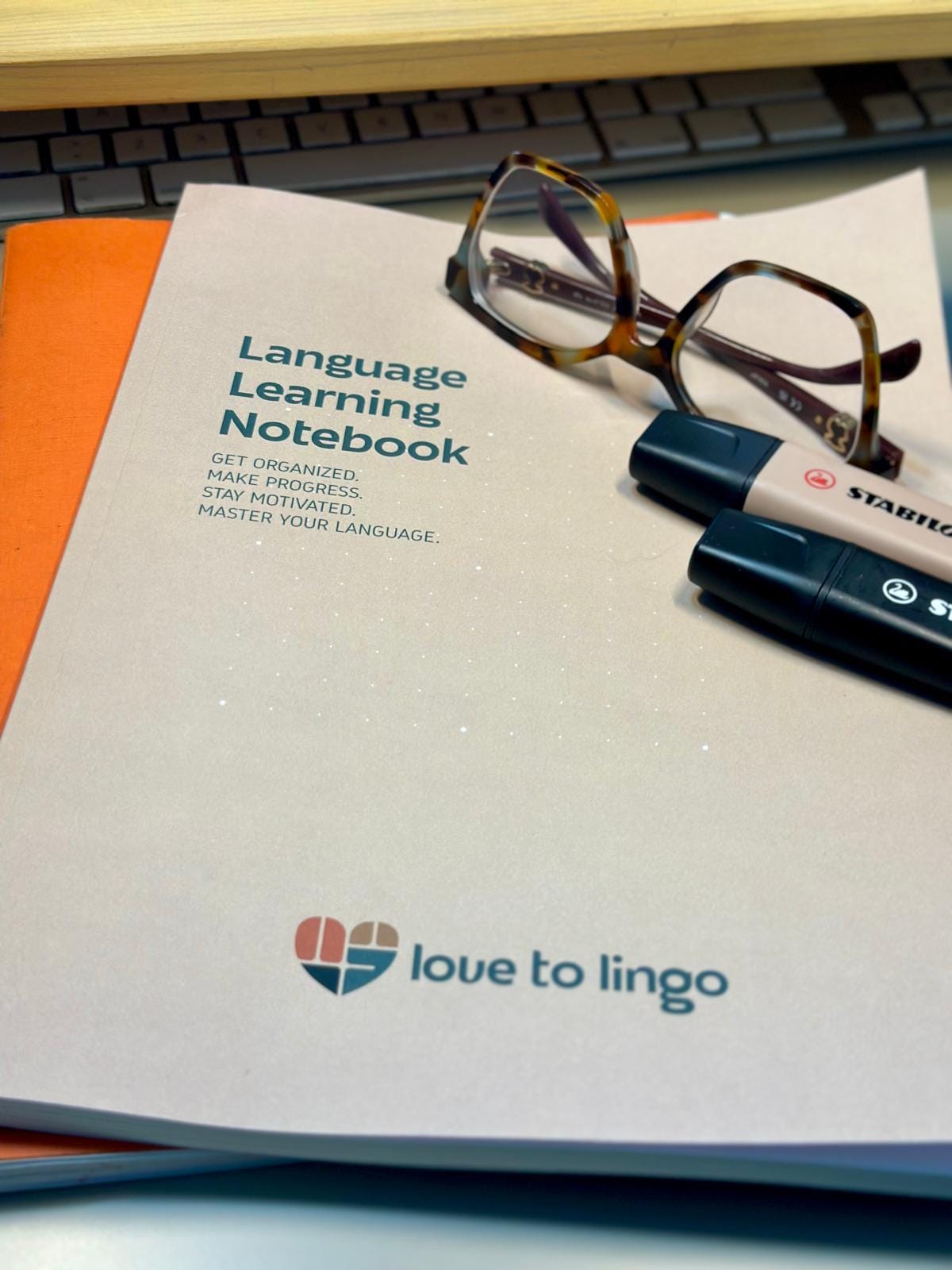What to Include in a Language Learning Lifestyle
Two essential elements for intermediate-level learners
As 2024 comes to a close, I’ve noticed my language learning practice (and a few other good habits) has slipped. While I firmly believe in re-evaluating priorities and honoring energy levels, I’m ready to get back into a routine that serves me well.
One of my priorities for 2025 is to establish a sustainable language learning practice. I want to start strong, and I’m guessing many of you feel the same way.
It’s easy to set the intention, but knowing how to set up a sustainable practice be tricky. There’s so much information out there, and you may have already tried some routines or systems that left you feeling frustrated, bored, or demotivated. I’ve been there, too. While some discomfort is a natural part of the learning process, sometimes those feeling are result of approaching language learning in a way that isn’t right for your current skill level. For instance, absolute beginners might feel overwhelmed by engaging with authentic content too early, while advanced learners may find memorizing vocabulary lists uninspiring.
At an intermediate level (B1-B2), we should focus on developing fluency, expanding our range of expression, and enhancing our accuracy. Selecting activities suited to our level will help us maintain consistent and meaningful progress.
If you’re an intermediate learner like me, here are two essential elements to include in your language learning lifestyle to improve fluency, range, and accuracy.
1. Language Learning Ecosystem
To make consistent progress, daily engagement with your target language is essential. Many people talk about creating an “immersion environment,” but I prefer to think of it as an ecosystem. An ecosystem is a supportive environment where your language practice thrives because it is integrated into different parts of your life.
Here are a few practical ways to build your ecosystem:
Consume media: Watch shows, listen to podcasts, or read books in your target language. Choose content that interests you to keep it enjoyable.
Change your settings: Switch your phone, computer, or social media apps to your target language.
Integrate daily tasks: Write shopping lists, journal entries, or to-do lists in your target language.
Prioritize speaking opportunities: Use your target language with anyone who knows it. You could also join a language exchange group or find a conversation partner online.
The goal is to surround yourself with the language and make it a natural part of your daily life. This way, you’re not just “studying” the language but living with it in a meaningful way.
2. Opportunities to Practice a Range of Skills
Improving as an intermediate learner means finding a way to consistently practice receptive skills (listening and reading), productive skills (speaking and writing) and reviewing grammar and vocabulary.
Receptive Skills
These are often the easiest to practice. You can simply swap your usual listening or reading habits with content in your target language. However, the key is finding material that’s just the right level:
Aim for understanding 80–90% of what you read or hear.
Use graded materials (books, podcasts, or blogs designed for language learners) to stay in your sweet spot.
Take advantage of tools like subtitles, transcripts, and dictionaries to make challenging content more accessible.
If you’re struggling, focus on understanding the gist of what you’re reading or hearing. You won’t catch every word and that’s okay. Getting comfortable with ambiguity is a crucial skill for language learners.
Productive Skills
Creating opportunities to practice speaking and writing may take more effort, but we need to make it a priority if we want to actually use our target language with other people.
Writing
If you’ve followed me for a while, you know I’m a big advocate for using the writing process to support language learning. My experience has primarily been with European languages that use the same script, so I’m not addressing writing in different scripts here (though I’d love to collaborate with someone who can share insights on that!)
When I talk about writing for language practice, I don’t mean creating polished products like emails or blog posts. Instead, I’m referring to using writing as a tool to build neural pathways and improve recall. Here are four key benefits:
Slow and deliberate practice: Writing is slower than speaking, giving you time to experiment with new grammar and vocabulary. You can look up words, consult notes, or test idioms without pressure.
Opportunities to edit: Unlike speaking, writing allows you to go back, correct mistakes, and refine your accuracy. This helps you identify recurring errors and improve over time.
Low-pressure environment: Writing is private. No one needs to see it until you’re ready, which removes the stress and anxiety often associated with speaking.
Progress tracking: Writing leaves a record of your growth. Revisiting older entries can be incredibly motivating as you see how far you’ve come.
Speaking
Speaking is often the most important skill to practice, but it can also be the most challenging. It requires depending on others or confronting the discomfort of stepping outside our comfort zones. As adults, we’re accustomed to feeling in control, which can make the vulnerability of speaking in another language particularly anxiety-inducing.
Speaking also involves many simultaneous mental processes:
Forming the idea or message you want to communicate.
Retrieving the correct words from memory in your target language.
Applying grammar rules to construct sentences.
Encoding the words into their correct sounds.
Physically articulating sounds clearly.
Checking for and correcting errors in real time.
Managing interference from other languages or distractions.
Ensuring your language use fits the context appropriately.
Regulating emotions to stay calm and confident.
That’s a lot, and it’s no wonder speaking in another language feels exhausting at first. The good news is that with practice, these processes become more automatic and less energy-intensive.
To practice speaking without a partner, try talking to yourself, your pet, a plant, or even an imaginary friend. Tools like ChatGPT can also simulate conversations. For practice with others, consider joining a language exchange group, finding a tutor, or attending classes. It may take some trial and error to find the right environment, but persistence is part of the journey.
Grammar and Vocabulary
Finally, an effective intermediate-level language learning practice should include focused work on grammar and vocabulary. The goal is to improve accuracy and range alongside fluency.
To build range:
· Record new words and phrases you encounter during receptive practice and actively incorporate them into your speaking and writing.
· Challenge yourself to think of alternative ways to express the same idea in your writing.
To improve accuracy:
· Keep a list of common errors you make and review it regularly.
· Use tools like ChatGPT to get feedback on your writing and identify patterns to work on.
Fresh Foundations
If this resonates with you but you’d like additional guidance, consider joining my free program, Fresh Foundations, starting January 1st. Each weekday in January, I’ll share a 15- to 30-minute activity designed to help you create a personalized and sustainable language learning routine. By the end of the program, you’ll have a system that fits your goals and lifestyle.
Let’s make 2025 a year of progress and confidence in language learning. Subscribe now to join us. I can’t wait to see what we achieve together!








Thank you for all these tips! I will definitely be applying these tips to my language learning in 2025
I love this post! When I learned my first language, I was so excited just to be doing things in a different language that it didn't matter how difficult or uncomfortable it was. In a weird way, that maid learning my second language harder. I could already do things in a non-English language if I chose to, so the struggle outweighed the appeal of using a new language. But I've really reconnected with truly wanting to have more experiences in my third language and that's added a lot more motivation.